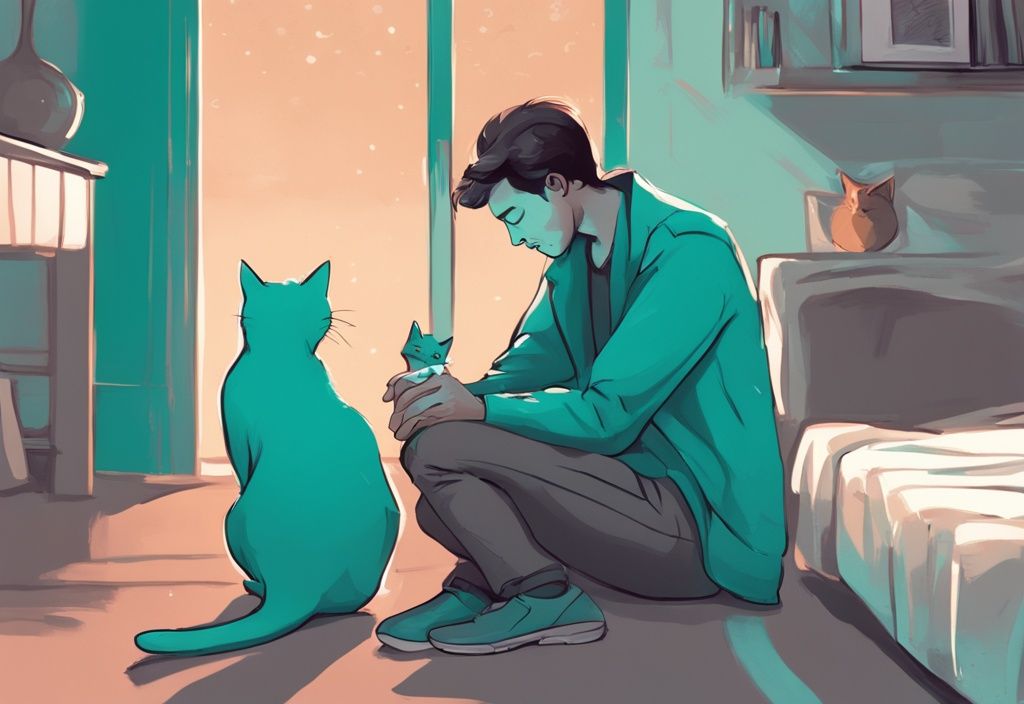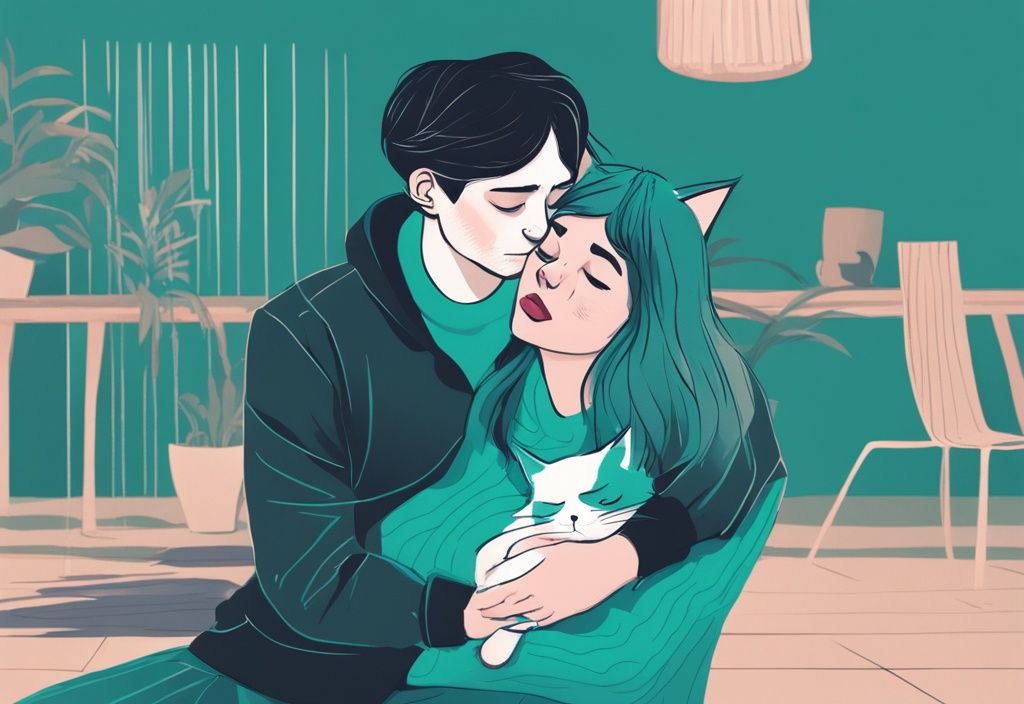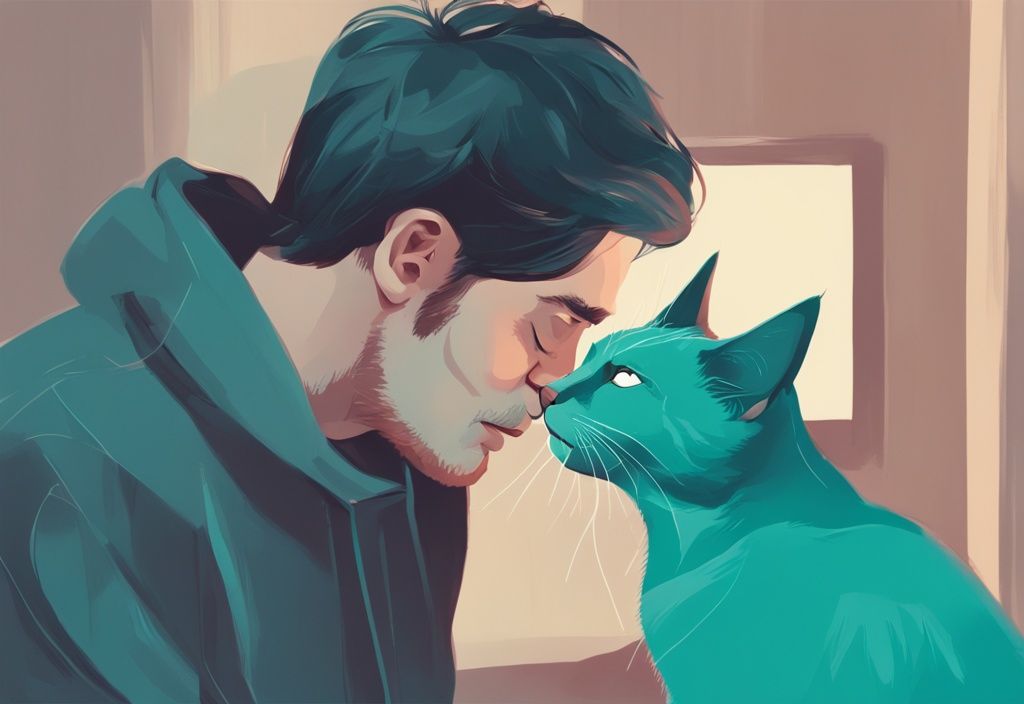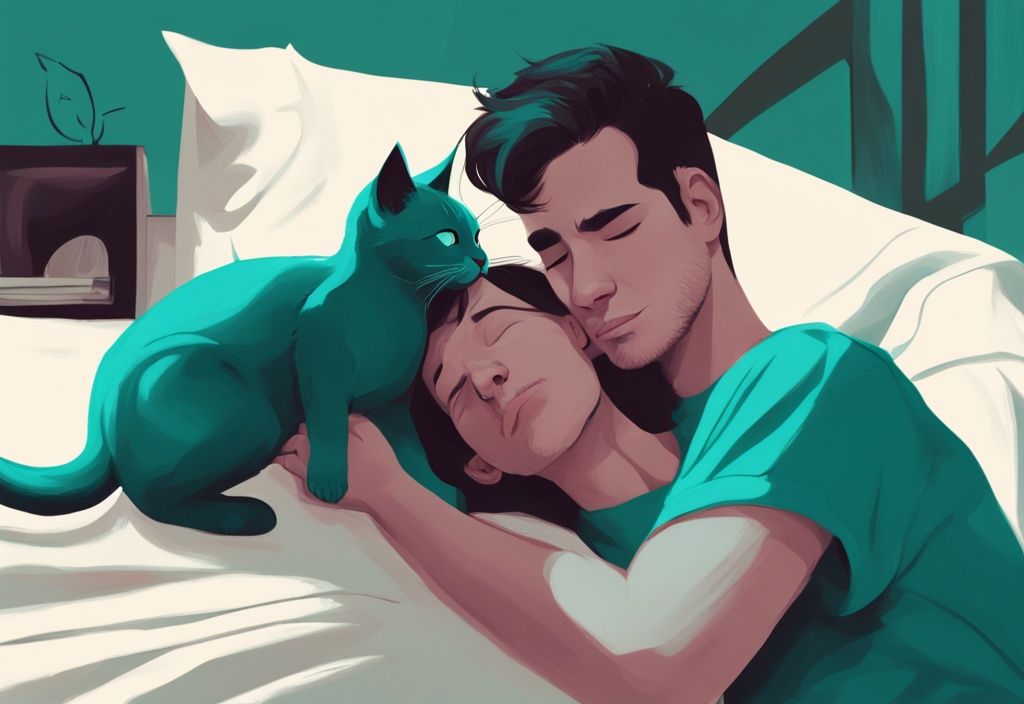Head-scratching over your male cat’s sudden swoon of affection? I was as surprised as you when my Whiskers started behaving the same way. Perhaps it’s a bit like my cuddly cat’s sudden desire for endless cuddles. Or maybe your feline friend is simply channeling their inner Romeo towards you!
This affectionate uproar can stem from various sources: age, health, or even hormonal changes. But fear not, our mutual aim here is to navigate through this fuzzy cuddle-riddle. Together, we’ll get to the bottom of this affectionate conundrum, ensuring your male cat’s well-being, and of course, strengthening your love-bound bond!
Brace yourself; we’re about to embark on a warm (and thoroughly loved-up) feline mystery tour! You’ll feel like a kitty detective by the end, promise!
Decoding the Reasons for Sudden Affection in Male Cats
Absence-Return: The Owner’s Effect
When you’re asking yourself, “why is my male cat suddenly so affectionate,” think about those times you were away. After hours or even days apart, a male cat may become extra cuddly when you come back. This reaction highlights the strong bond between you two. On reuniting, your cat’s excitement could translate into more snuggling and purring. Essentially, your furry friend missed you and is seeking comfort and reassurance. Spending quality time together can reinforce this bond, making your cat feel secure and loved.
The Influence of a Nearby Female Cat
Your curiosity about “why is my male cat suddenly so affectionate” might also be answered by the presence of a nearby female cat, especially if she’s in heat. Unneutered males are particularly susceptible to hormonally driven behaviors. The mere scent or even the proximity of a female cat can trigger a surge in affection. It’s all about those natural mating instincts kicking in. If this sounds familiar, neutering your male cat can be an effective solution. Not only does it help stabilize his behavior, but it also promotes his overall well-being.
Impact of Male Cat Hormonal Changes
Hormonal changes can be another reason behind your male cat’s sudden affection. Although more common in females, males can also undergo behavioral adjustments due to hormonal fluctuations. For instance, an imbalance in testosterone levels might result in increased affectionate behavior. If you’re pondering, “why is my male cat suddenly so affectionate,” these hormonal factors could very well be at play. A visit to the vet can help diagnose and treat any underlying hormonal issues. Veterinary care is key in ensuring a balanced and happy kitty, helping manage those unexpected bursts of affection.
Health-Triggered Affection: What You Should Know
When you notice your male cat suddenly becoming extra affectionate, it can be both heartwarming and puzzling. This behavioral shift can often be linked to underlying health issues. Let’s delve into how medical conditions can impact your cat’s penchant for snuggles and headbutts.
Medical Disorders and Changes in Behavior
Hyperthyroidism
Hyperthyroidism is a common condition in older male cats that can shake up their usual demeanor, often causing increased affection. You might see your cat losing weight despite a ravenous appetite and notice a restlessness that’s out of character. It’s as if your furball is saying, “I need some comfort!”
If you’re scratching your head and thinking, “Why is my male cat suddenly so affectionate?”, hyperthyroidism might be the culprit. Consulting a vet for a physical examination and specific blood tests can confirm this. Don’t worry—there are treatment options to get your kitty’s thyroid back in balance, which should help normalize behavior.
Diabetes Mellitus
Diabetes Mellitus is another sneaky condition that might transform your independent male cat into a cuddle bug. With this illness, you might notice increased thirst, frequent bathroom breaks, and weight loss. This discomfort can drive your cat to seek more affection as a way to communicate, “I need help!”
If you’ve been pondering, “Why is my male cat suddenly so affectionate?”, it’s crucial to get a vet to check for diabetes through blood tests and urine analysis. Treatment usually involves diet changes, insulin therapy, and regular monitoring, which can help your feline friend feel better and behave more like his usual self.
Growing Older: The Shift in Cat Behavior
As male cats journey through the years, their behavior might lean toward being more clingy and affectionate. Aging can make them crave the comfort of familiar routines and people. Imagine your cat saying, “I need extra love and safety!”
Cognitive dysfunction is also common as cats age, often making them search for reassurance. Wondering, “Why is my male cat suddenly so affectionate?” If your feline friend is in his golden years, this behavior is quite normal. Consistent care, a stable environment, and lots of love can make your older cat feel secure and less anxious—strengthening the bond you share.
By understanding these health-related triggers, you can better respond to your cat’s sudden affectionate behavior and ensure they receive the care they need.
Emotional and External Factors: Crack the Code
Sometimes, behind that sudden flood of affection from your male cat, there’s a flurry of emotions and external influences. Wondering why your furry friend has become so lovey-dovey? Let’s dive into the possible reasons!
Stress Triggers and Affection: Is There A Link?
Unfamiliar Guests: The Stress Element
You know how you feel a bit unsettled when having unfamiliar guests over? Well, your male cat feels it too! The sudden appearance of strangers or deafening noises can skyrocket his stress levels. It’s like he’s saying, “Help, human! I need comfort!” This drive for reassurance results in your cat becoming suddenly very affectionate. Consider creating a serene hideaway for him—think soft bedding and familiar scents in a quiet corner—so he feels safe and calmed amidst all the chaos.

Noise and Its Influence on Cat Behavior
Imagine those obnoxious sounds during a thunderstorm or fireworks display! Loud noises can be massive stress monsters for your cat, pushing him into hiding or leading to excessive affection-seeking. Your male cat might suddenly plaster himself against you for a sense of security. Reducing the racket with soundproofing tricks or creating hushed spaces can work wonders for his nerves. Try some interactive play in a peaceful environment to help distract and soothe him.
The Affectionate Response to Illness
Sometimes, that clingy behavior isn’t just about external stress but internal discomfort.
A sudden surge in your male cat’s affection might be a silent cry for help because he’s feeling under the weather. Look out for other clues like shifts in his eating habits, litter box routines, or energy levels. If these signs pop up, a vet visit is a must to rule out any serious health issues. Regular check-ups are like your cat’s ticket to a happy, healthy life.
The Cry for Attention: What It Means
Does your male cat come off as suddenly needy? He might just be feeling a tad ignored or lonely. Lack of regular chit-chat and playtime can make those demands for attention skyrocket. Spice up your routine with more bonding moments—interactive play sessions, plenty of petting, and chatting with your cat can work wonders. Consistency is the magic word here; daily doses of love and engagement can reassure him and reduce those out-of-nowhere affection spikes.
Behavioral Influences and the Role of Your Household
Ever wondered why your male cat is suddenly showering you with extra love and snuggles? The dynamics within your home can play a big role in shaping this behavior. Let’s dive into a few intriguing reasons behind this affectionate surge, ensuring you can understand and handle it with grace.
Feeling Hungry: Is Mealtime an Affection Trigger?
One common reason for a male cat suddenly showing increased affection is hunger. Around mealtime, a male cat might become more affectionate to communicate its need for food. This behavior can manifest as purring, rubbing against you, or following you more closely. By observing their feeding schedules and ensuring they are well-fed, you can manage this behavior effectively.
Maintaining a consistent feeding schedule can help reduce the urgency and extra affection displayed by your cat around mealtimes. Imagine it – your furry friend is simply reminding you about dinner time in the cutest possible way!
Claiming the Top Spot: Understanding Cat Competition
The dynamics within a household can greatly influence a male cat’s behavior, particularly when it comes to competition for attention. The arrival of new family members, pets, or partners can lead to a male cat becoming more affectionate as it attempts to secure its place and time with its owner.
This increased affection is a way for the cat to reaffirm its bond and ensure it remains a primary focus amidst the changes. By understanding and balancing attention among all household members, you can help alleviate competition-driven affection.
Providing individual time and space for each pet and ensuring they feel secure can reduce stress. Imagine giving your cat that extra five minutes of undivided attention – it might just be the trick to keeping peace and reducing the need for your cat to compete for your love.
Bonds, Brains, and Behavior: Understanding Your Male Cat Better
Cats are fascinating creatures, each with their own quirks and behaviors that keep us endlessly entertained (and sometimes puzzled). Diving into the reasons behind your male cat’s sudden surge in affection can open a world of understanding about their unique sociology and psychology.
Growing Bond: Is Your Cat Growing More Affectionate With Age?
As male cats age, you might notice a significant increase in their affectionate behaviors. This phenomenon often stems from a deepening bond cultivated over years of shared experiences and reciprocal care. Spending more time with your male cat strengthens your relationship, creating an environment where mutual trust and affection can flourish.
Aging cats often crave more consistent companionship, seeking the warmth and comfort that their familiar human provides. Just like us, older cats enjoy the reassurance of a cozy cuddle, particularly when they start experiencing cognitive or physical changes. Imagine your cat curling up to you more often as if saying, “I trust you completely!”
Personality Shifts in Cats: What to Expect
Every cat has a unique personality, and these traits can significantly influence their behavior as they grow older. It is not uncommon for male cats to exhibit personality shifts due to different life stages or external factors.
For instance, a cat that was once aloof may become more sociable and affectionate as it matures. Changes in their environment or their health can also affect these shifts. Understanding and adapting to your cat’s evolving personality can help you better address why your male cat is suddenly so affectionate, ensuring that you can meet their emotional and physical needs appropriately.

Imagine your once-independent cat suddenly transforming into your little shadow, constantly seeking your attention. Changes like these are their way of expressing new needs and desires as they adapt to life’s inevitable changes.
Is Your Home Environment Causing The Change?
Has your male cat suddenly become more affectionate, leaving you puzzled, wondering, why is my male cat suddenly so affectionate? Changes in your home environment could be the culprit. Cats thrive on stability and familiarity, and any disruptions can make them seek extra emotional security. Imagine how you’d feel if someone secretly rearranged your living room overnight—uneasy, right? The same goes for your feline friend. A sudden rearrangement of furniture, new family members, or even minor changes in daily routines can elevate stress levels in cats. Often, they respond to this uncertainty by becoming more affectionate, seeking comfort from their trusted companions—you.
Creating a stable and comforting environment is crucial in managing these behavioral shifts. Make sure your cat has access to serene, safe spaces where it can retreat when feeling overwhelmed. Maintaining a consistent daily routine for feeding, play, and interaction is vital. By doing so, you offer your cat a sense of predictability, which can alleviate stress and reduce the need for excessive affection seeking.
Routine Changes and the Impact on Cat Affection
Another intriguing reason you might be witnessing a sudden surge in your cat’s affection is routine changes. Cats are creatures of habit, and any deviations from their established routines can be unsettling. Whether it’s a new work schedule, changes in household activities, or the introduction of new pets, these modifications can lead your cat to seek comfort and stability through increased affection.
To tackle this, try to keep your cat’s routine as consistent as possible. Regular feeding times, play sessions, and interactions can help your cat feel more secure. If changes are unavoidable, introduce them gradually to give your cat time to adapt. Grasping why your male cat is suddenly so affectionate and addressing the underlying routine changes can help maintain a balanced and happy environment for your cherished feline friend.
Dealing With a Sudden Spike in Your Cat’s Affection
Oh, the curious case of the suddenly affectionate male cat! It’s one of those delightful mysteries of pet ownership that can leave you feeling both adored and puzzled. Let’s dive into how to respond and what to look out for when your usually independent feline turns into a clingy cuddle bug.
How to Respond to Increased Affection
When your male cat shows a sudden spike in affectionate behavior, it’s a moment to cherish and nurture. Understanding *why is my male cat suddenly so affectionate* can unlock new dimensions in your bond. Here are some playful, pet-lover tips on responding:
Firstly, engage with your cat in a reassuring manner. They might be seeking comfort, much like we do when reaching out for a hug. Try petting, gentle talking, and offering a cozy lap – these gestures can work wonders in soothing and reassuring your furball.
Secondly, ramp up the interactive playtime. Think toys, games, and activities that not only entertain your kitty but also strengthen your bond. Regular play can channel their energy positively, keeping them mentally and physically stimulated. Who knew a feather toy could be the cornerstone of a happier, more affectionate cat?
Identifying Red Flags: When to Consult a Vet?
While a sudden surge in affection can feel like the height of kitty bliss, it’s essential to stay observant. Sometimes, these behaviors can hint at underlying issues. Keep an eye out for any additional changes in your cat’s routine – whether it’s eating, drinking, or litter box habits – as well as physical health indicators like weight changes, lethargy, or digestive problems.
For instance, if your cat’s newfound affection is accompanied by symptoms like weight loss or increased thirst, there could be an underlying medical condition at play, such as diabetes or hyperthyroidism. In these cases, consulting a vet promptly ensures your cat gets the care they need. A thorough examination and necessary tests can diagnose potential issues, allowing for timely and effective treatment. For pet owners interested in understanding how a dog is perceived in human contexts, you can read more about it in our Dog is Human review.
Understanding *why is my male cat suddenly so affectionate* is more than just a quest for answers – it’s about providing the best care and attention, whether the reasons are behavioral, emotional, or medical. By staying observant and responsive, you’ll ensure your furry companion’s well-being and enjoy those sweet, affectionate moments to the fullest.
Conclusion: Understanding Your Cat’s Affection Spike
Understanding why your male cat is suddenly so affectionate involves considering a variety of factors, both behavioral and medical. Cats communicate through their actions, and a sudden increase in affection can have several underlying causes, from emotional and environmental changes to health-related issues.
First, it’s crucial to recognize the profound bond that can exist between a cat and its owner. If you’ve been away and just returned home, your male cat might shower you with affection as a show of excitement and the deep connection he feels. Have you noticed your cat being extra cuddly when there’s a new family member or pet? That’s his way of seeking reassurance and attention to reaffirm his place in the family hierarchy.

Environmental stressors like loud noises or unfamiliar guests can also trigger this behavior. It’s like when Whiskers hides under the bed during a thunderstorm, only to emerge later, craving your comfort. Stress and anxiety often prompt cats to seek solace from their owners. Creating a quiet, safe space can help ease their stress and reduce those affection spikes.
Health issues are another significant aspect to consider. Conditions such as hyperthyroidism, diabetes, or even the natural aging process can cause behavioral changes, including increased affection. If your cat shows other symptoms like weight loss, increased thirst, or restlessness, consulting a veterinarian is essential to rule out any medical problems.
Hormonal changes in unneutered male cats, especially when a nearby female is in heat, can also result in sudden affectionate behavior. Neutering can mitigate such hormonally driven behaviors and help stabilize your cat’s demeanor.
As cats age, they may naturally become more affectionate, seeking familiar routines and the comfort of their owner’s presence. Cognitive changes linked to aging might lead them to crave more attention as a form of reassurance.
Ultimately, a spike in affection is a multifaceted occurrence that requires a holistic approach to understand. Observing your cat’s overall behavior, keeping an eye on any health changes, and providing a stable, loving environment are key to ensuring their well-being. Always consult a vet when in doubt, to ensure that any underlying health issues are promptly addressed.
By staying attentive to these factors, you can better respond to your cat’s needs, ensuring both his happiness and health.
FAQs: Clearing All Doubts
Is My Male Cat’s Increased Affection With Age Normal?
Absolutely! As your furry friend gets older, it’s completely normal for him to become more lovey-dovey. Just like people, cats can experience cognitive changes over time, and they often form a deeper bond with their humans. So, if your male cat is suddenly so affectionate, it might simply be an age thing.
Can Stress Drive My Cat to Be More Affectionate?
Oh, you bet! Cats, much like us, crave reassurance when they’re feeling stressed or anxious. If your kitty is curling up with you more often, he might be seeking that comfort and calm he associates with you. So, if you’ve noticed your male cat suddenly being super affectionate, stress could be a potential reason.
Should I Worry about My Cat’s Sudden Affectionate Behavior?
Sometimes, a sudden spike in affection can ring alarm bells. Keep an eye out for other symptoms like changes in weight, appetite, or energy levels. If your kitty’s loving nature comes with some concerning changes, it might be wise to schedule a vet visit to rule out any underlying medical issues.
How to Identify a Medical Issue from Increased Affection?
It’s all about the little clues. Look for things like weight loss or gain, fluctuations in appetite, changes in drinking or urination habits, and energy levels. If these signs are there along with all the extra snuggles, a vet check-up will give you peace of mind and ensure your fur baby’s health is in tip-top shape.
What If My Cat’s Increased Affection Is Stress-Triggered?
If stress seems to be behind your cat’s newfound affection, try to identify the stressors in the environment. Is there a new pet? A change in routine? Provide a stable, comforting routine and ensure there are plenty of safe spaces for your kitty to retreat to. Creating a serene environment can help your feline friend feel more secure and less stressed.
